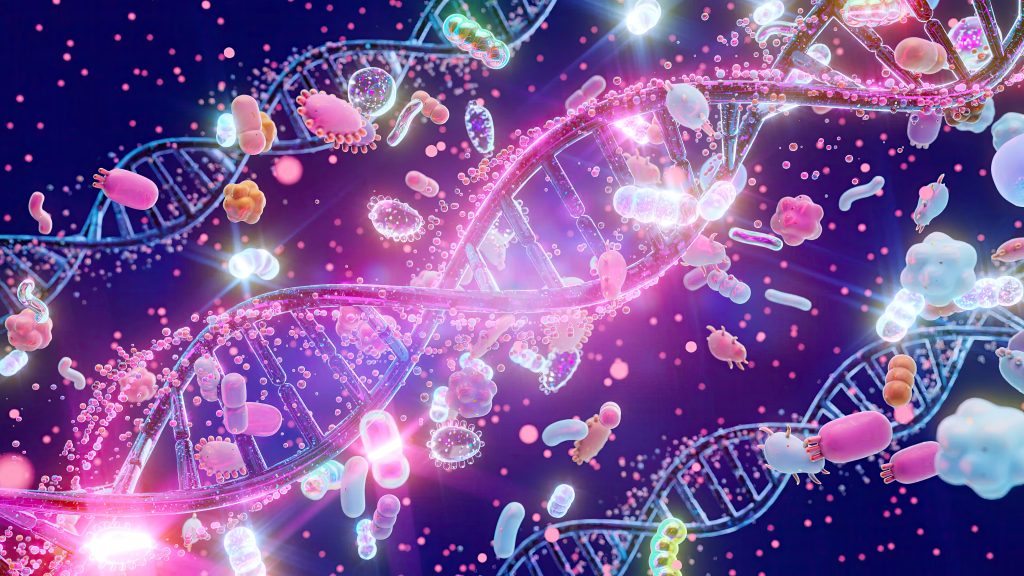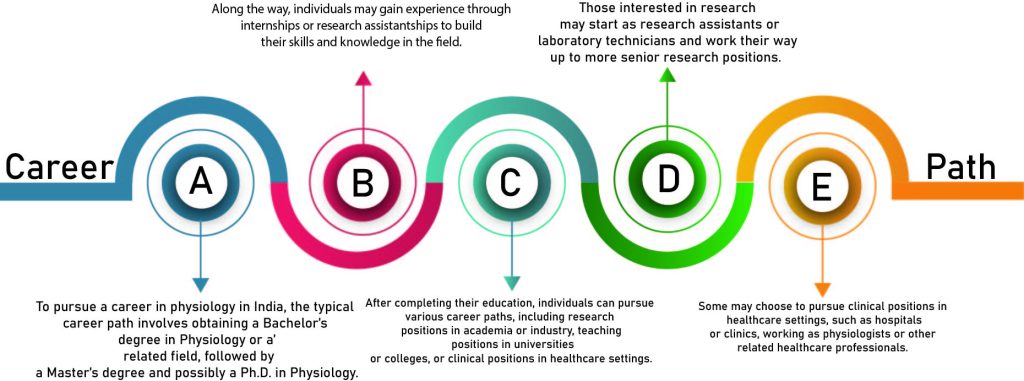Physiology is the scientific study of how living organisms function, from the molecular and cellular level to the entire organism. Physiology seeks to understand the mechanisms that control and regulate the body’s functions, such as how cells communicate with one another, how organs work together to maintain homeostasis, and how different systems of the body interact to produce complex behaviors and responses. Ultimately, the goal of physiology is to deepen our understanding of the complex workings of living organisms and to apply this knowledge to improve human health and well-being.

Work description
Physiologists work to understand the mechanisms that underlie the functioning of living organisms, from the molecular and cellular level to the entire organism.
They may conduct experiments and research to study how different systems of the body interact and how they respond to various stimuli.
Physiologists may also design and conduct clinical trials to test new treatments and therapies for various diseases and disorders.
Additionally, they may work in academia, teaching and mentoring students in the field of physiology or related fields.
High Demand
Opportunities for conducting cutting-edge research to deepen our understanding of the human body and its functions.
Lucrative salaries
Possibility of contributing to advancements in medical treatments and therapies.
Opportunities for innovation
Potential to make a meaningful impact on human health and well-being.
Versatility
Possibility of working in a variety of settings, including research, academia, healthcare, and industry.
Flexibility
Opportunities for ongoing learning and professional development.
High stress
Can require extensive education and training, including obtaining a Ph.D.
Long hours
Can be highly competitive, with limited job opportunities in some areas of the field.
Competitive field
May require long hours and intense workloads, especially in research or clinical settings.
Constant learning
Can involve working with complex equipment and techniques that require precision and accuracy.
Isolation
Some research may require the use of animal models, which can be controversial and emotionally challenging for some individuals.
The cost of pursuing a career in physiology in India can vary depending on the level of education and the institution chosen.
For a Bachelor’s degree, the cost can range from around INR 50,000 to INR 2 lakhs per year, depending on the institution. For a Master’s degree, the cost can range from around INR 1 lakh to INR 3 lakhs per year. Pursuing a Ph.D. in physiology can be more expensive, with costs ranging from around INR 50,000 to INR 5 lakhs per year, depending on the institution and research expenses.
Additionally, there may be other costs associated with pursuing a career in physiology, such as textbooks, laboratory equipment, and research materials.
[wpcharts type=”horizontalbarchart” bgcolor=”red:gray:yellow,blue:gray:yellow,random:gray:yellow,purple:gray:yellow” min=”0″ legend=”true” titles=”2 year , 5 year” values=”3,7,5,12″]
The earning potential of a career in physiology in India can vary depending on the level of education, experience, and type of job.
For entry-level positions, such as research assistants or laboratory technicians, the salary can range from around INR 2-4 lakhs per year. With a Master’s degree, individuals can pursue positions such as research associates, lecturers, or assistant professors, which can offer salaries of around INR 4-8 lakhs per year. Those with a Ph.D. can pursue more senior positions, such as professors, senior research scientists, or industry consultants, which can offer salaries of INR 8 lakhs or more per year.
Additionally, individuals with expertise in specialized areas, such as pharmacology or neuroscience, may have higher earning potential.
[wpcharts type=”horizontalbarchart” bgcolor=”red:gray:yellow,blue:gray:yellow,random:gray:yellow,purple:gray:yellow” min=”0″ legend=”false” titles=”Entry-Level, Mid-Career, Senior-Level ” values=”5,15,25,35,45,55″]
Strong analytical skills and attention to detail.
Strong understanding of scientific methods and laboratory techniques.
Excellent communication and interpersonal skills
Ability to work well in a team environment.
Persistence and dedication to ongoing learning and research.
Solid understanding of biology, anatomy, and related fields.
Ability to think critically and creatively.
Lack of attention to detail.
Poor organizational skills.
Inability to work well in a team environment.
Limited critical thinking skills.
Discomfort with working with animals and handling bio hazardous materials.
Weakness in basic sciences such as biology, anatomy, and related fields.
Poor communication and interpersonal skills.
Work-life balance
Work-life balance can vary depending on the specific field of physiology, such as academic research versus clinical work.
The workload can be heavy, particularly when working on research projects or in a clinical setting. Physiologists may need to work long hours or be available on-call depending on the job. Flexibility in work hours may be limited depending on the nature of the work and the employer.
There may be opportunities for remote work or flexible scheduling in some positions. Career advancement opportunities may come with increased work responsibilities. It’s important to prioritize self-care and find ways to manage stress outside of work.

Advancing knowledge and understanding of how the human body works.
Contributing to the development of treatments and therapies for a wide range of diseases and medical conditions.
Improving the quality of life for individuals with disabilities or chronic conditions through rehabilitative therapies.
Contributing to the development of new medical technologies and devices.
Enhancing athletic performance through the application of physiological knowledge and training methods.
Advancing the field of healthcare through research and the development of new techniques and therapies.
Clinical Physiology
Focuses on the application of physiological principles to the diagnosis and treatment of medical conditions.
Neurophysiology
Examines the functioning of the nervous system, including the brain, spinal cord, and peripheral nerves.
Respiratory Physiology
Investigates the functioning of the respiratory system, including lung function and gas exchange.
Reproductive Physiology
Studies the reproductive system, including reproductive hormones and the process of conception and childbirth.
Environmental Physiology
Explores how the body responds to environmental stresses such as temperature, altitude, and pollution.
Conclusion:
In conclusion, a career in physiology can be highly rewarding for those who are passionate about the workings of the human body and its functions. Physiologists contribute to the advancement of medical knowledge, the development of treatments and therapies, and the improvement of public health. Pursuing a career in physiology requires a strong foundation in the basic sciences, excellent analytical and problem-solving skills, and a dedication to ongoing learning and research. With a high demand for qualified physiologists across a variety of fields, this career path is a promising and fulfilling one for those interested in the intersection of science and medicine.



